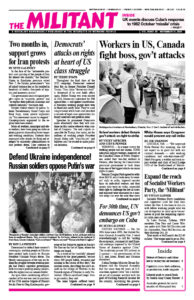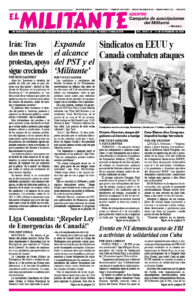In the face of the “nationwide protests and uprising of the people of Iran for almost two months,” the Teachers’ Union in Kurdistan province stated Nov. 7, the Iranian government’s “use of naked violence has so far resulted in hundreds of deaths, thousands of injuries and numerous arrests.”
The government must recognize people’s rights to “assemble, protest” and “to express their political, economic and cultural demands,” the union said.
Despite violent attacks by police, Islamic Revolutionary Guard Corps and Basij thugs, many protest organizers say “this movement cannot be stopped.” Counterprotests organized by the regime have been anemic.
More oil workers, municipal and other workers, have been going on strike or joining protests demanding better wages and working conditions. Students have regrouped after attacks by Basij and attempts by university administrators to shut protests down. They continue to hold sit-ins and other activities. Popular sports figures and musicians have expressed their support.
Daily protests began after the Sept. 16 death of Mahsa Amini. The young Kurdish woman died three days after she collapsed following her arrest by the “morality” police in Tehran for violating the reactionary regime’s dress code.
Her death unleashed pent-up anger at discrimination against oppressed nationalities and religious minorities, lack of political freedoms, the oppression of women, attacks on unions and the impact of the economic crisis. The protests, like those in 2017-18 and 2018-19, reflect opposition to the regime’s use of working people as cannon fodder in its reactionary military adventures throughout the Middle East.
The repression has been fiercest in Kurdistan, Baluchistan, Azerbaijan and other regions populated by oppressed nationalities who face discrimination in jobs, housing, the use of their language and in their religious beliefs, which differ from those of the Shiite-based regime.
Sept. 30 is now known as “Bloody Friday,” when government forces slaughtered more than 40 people in Zahedan, in the Sunni Muslim Baluchistan region. The government fired the police chief and promised an investigation. But on Nov. 4, its repressive forces attacked Khash, another city in Baluchistan, killing 10. The next day working people and shopkeepers shut down the city in protest. Brutal attacks in the Kurdish region have only fueled more protests there as well.
As a result of the regime’s repression, almost every day there are funerals and traditional Muslim mourning ceremonies that take place 40 days after the death of a loved one. The services have become protest actions, often with thousands of people chanting “freedom” and “down with the dictatorship.”
Oil workers say free jailed protesters
The Organizing Council of Oil Contract Workers said Nov. 7 that many of more than 250 union members arrested during protests at oil complexes in Bushehr and Khuzestan provinces on Oct. 10 and 11 have been released. The union is demanding “the immediate and unconditional release” of remaining detainees, as well as all those arrested at recent protests.
On Nov. 7 workers on the offshore platforms at the government-owned Pars Oil and Gas Company began a hunger strike and refused to send production reports to management. Parliament has increased pay of the regimes armed forces by 20%, the workers said, but the oil workers have not had a raise in 10 years.
In the last week there have been new protests by municipal landscape workers and by workers at a combine factory over nonpayment of wages.
Worried at the depth of the protests, 227 out of 290 members of the Iranian parliament, called on the government to crack down harder Nov. 6.
But Shargh daily, which supports the “reformist” wing of the regime, quoted parliament member Rashidi Kouchi as saying that many demands of protesters about “livelihood, welfare and basic necessities are right.” Reform is needed, he said, but can’t begin until the atmosphere is “calmed down” — a not so veiled call to end the demonstrations.
Protesters have little trust in any wing of the regime and no intention of stopping their actions.
At Sharif University in Tehran, where Basij thugs attacked students Oct. 2 and administrators banned some students from campus, the Islamic Student Association forced officials to give permission for an indoor protest meeting that drew a crowd of nearly 1,000 students. Participants demanded the removal of plainclothes security agents from campus, the release of imprisoned students — including two jailed more than three years ago — and the end of a ban on others.
Tehran University students put out a flyer to advertise a reading of the play “Enemy of the People” by Norwegian playwright Henrik Ibsen. It is about the hypocrisy of government officials and the media.

